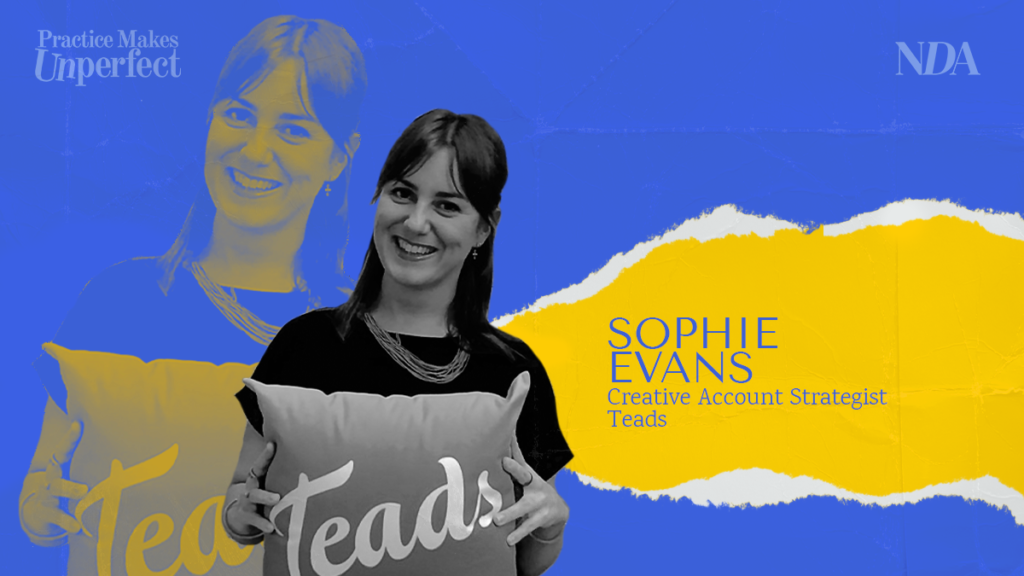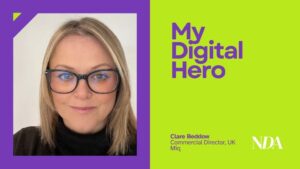By Sophie Evans, Creative Account Strategist, Teads
These articles have been written by the latest cohort of the Practice Makes Unperfect programme – a course that helps women find and finesse their public voices.
Very early on in my career, I was told by an interviewer that I was a risky hire. He couldn’t tell if I would ‘sink or swim’. I didn’t understand what that meant at the time, but later I did.
I was entering a ‘fast paced’ world of work. Navigating large personalities and egos, targets that are forever growing and deadlines forever looming. In my 14 year career I have both flourished and floundered at work, within a variety of environments, from digital start-ups to well established and traditional media companies. The one thing that is consistent is the fast paced nature of the work, always. But the culture has been the difference between whether I thrived, or crashed and burned.
Brewdog has recently hit the headlines for all the wrong reasons. This passage from Brewdogs initial ‘apology’ in response to an open letter from an army of ex and current employees calling out a toxic environment, struck me on a personal level.
“It is fair to say that this type of fast paced and intense environment is definitely not for everyone, but many of our fantastic long term team members have thrived in our culture. Our culture is built on rewarding and developing great people and focussing on growing our business.”
The letter calls out a culture of fear, with work ‘making them feel belittled and/or pressured into working beyond their capacity, and often eventually feeling forced out of the business’.
Brewdog is a public case, but stress at work is very common. Deloitte’s ‘burnout’ survey in 2018 identified that 77% suffered from burnout in their current jobs, 51% of those, more than once.The main drivers of burnout were lack of support and unrealistic expectations.
In 2019/20 stress, depression or anxiety accounted for 51% of all work-related ill health cases and 55% of all working days lost due to work-related ill health. In some cases, this can get really ugly. For me, in one particularly toxic phase in a particularly unhealthy workplace, I was prescribed resilience training in response to voicing my serious concerns on the impact of the chaos at work on my health. It felt like a kick in the mouth. I burnt out quite spectacularly, dealing with employment lawyers from a hospital bed.
A culture that rewards and supports only those that do whatever it takes and at whatever cost to their own lives, just to meet that deadline, or achieve that growth; a culture that encourages, even demands, employees to put the job ahead of their friends, families, even their health, breaks all of us eventually.
Research by Oxford University’s Saïd Business School found a conclusive link between happiness and productivity. I’m fortunate to have experience with companies where I have been properly supported to do my job and maintain my life. In healthy environments my capacity and abilities to exceed even my own very high expectations of myself, improve remarkably.
Healthy work environments actually allow for an even faster pace; time is not wasted on attacking or undermining others, there is less anxiety breeding and eating away at confidence and energy levels, there is better communication on a higher vibration, and the research shows that happier teams are 13% more productive.
Although the employer ultimately holds the responsibility and the power to set the culture and provide safe and supportive work environments (whatever the pace), I’ve come to see that maintaining culture works both ways.
As tempting, and fair, as it may seem to apportion all blame to employers, every individual has a part to play in both the negative and positive experiences at work; there is co-responsibility in every event. Taking hold of that responsibility is what gives us power.
Here is what I have learned about how to ‘swim’ and not ‘sink’ in fast-paced environments.
Knowing and meeting my needs. Beyond the universal basics, without my other needs being met, I dilute and deteriorate. It is my responsibility to ensure I get enough rest, exercise, inspiration, adventures and fun times with my friends and family, these are the things that support my healthy body and mind.
Setting and enforcing boundaries. Yes, I can work over the weekend, through the night, back to back meetings, but at great cost to myself? The cost to my life, my health, my family, is never worth it. Boundaries protect us and allow us to be our best all of the time, in all areas of our lives.
Communicating effectively. I am a people pleaser and I instinctively say yes. It is my responsibility and choice to say no to anything that is unmanageable. This is really hard, but there are ways to communicate effectively. Owning your reactions and responses is key to having productive conflict resolution. An attack on your employer, will result in defence, ie ‘you make me feel so stressed’ vs ‘when the workload impacts on my ability to get a good night’s sleep, I suffer with xyz’, will be heard and reacted to differently.
Knowing when to leave. Sometimes, even when you expertly implement all of the above, it still fails to make a difference. Even the most ‘resilient’ individuals cannot swim in an ultimately toxic environment. Brewdog employees know this all too well. So when do you walk away? My advice would be, as soon as you can. And if you can’t straight away, then seek support from outside of your company, because you’re not alone. Nabs were an amazing support to me.
When we are passionate about what we do all of our emotions get amplified. In advertising, with so much of ourselves invested in the work, we need to be attentive to maintaining the healthy environments we rely on to swim, not sink.
It does not take a certain personality type to thrive in a ‘fast paced and intense’ environment, if we all take responsibility for the positive culture needed to protect and enhance our experiences at work, none of us will drown, regardless of the pace.









